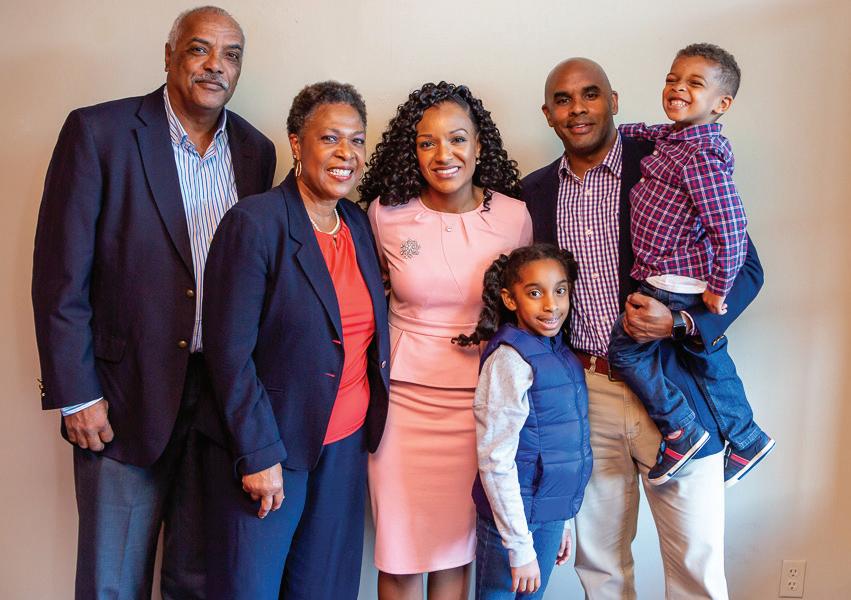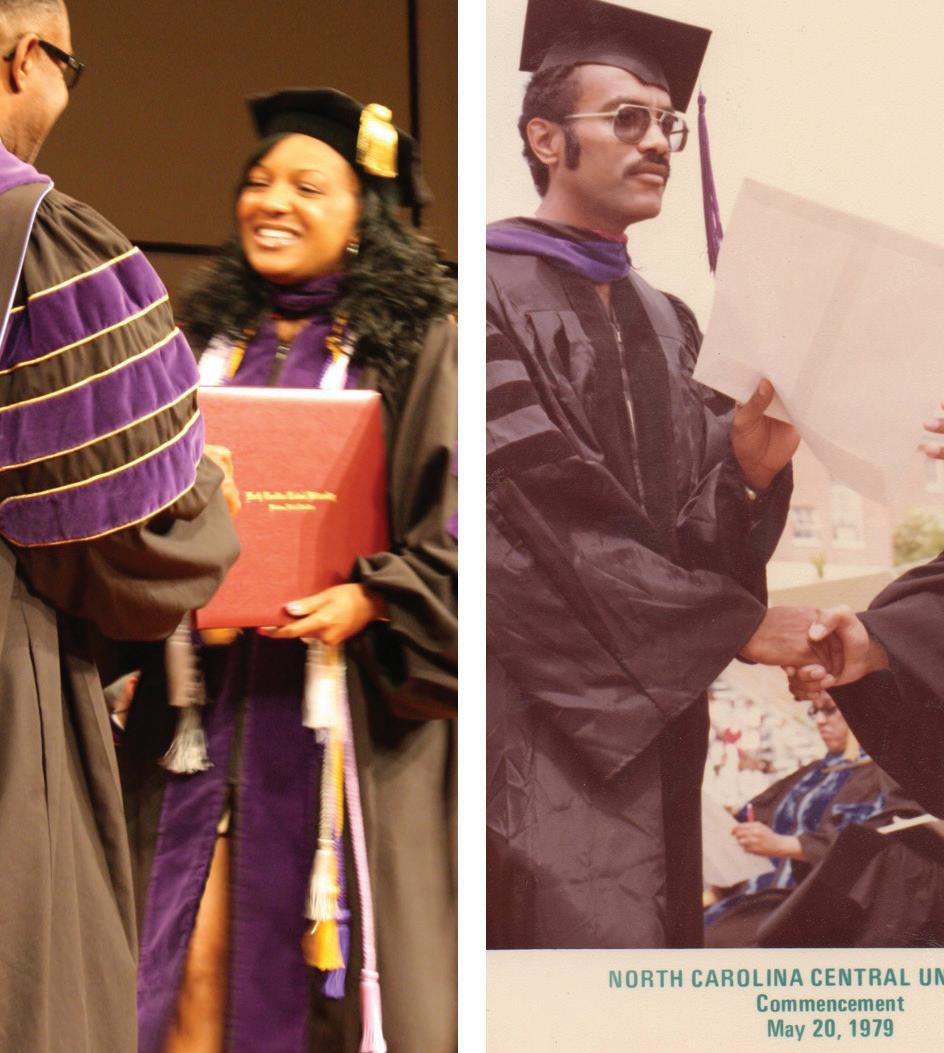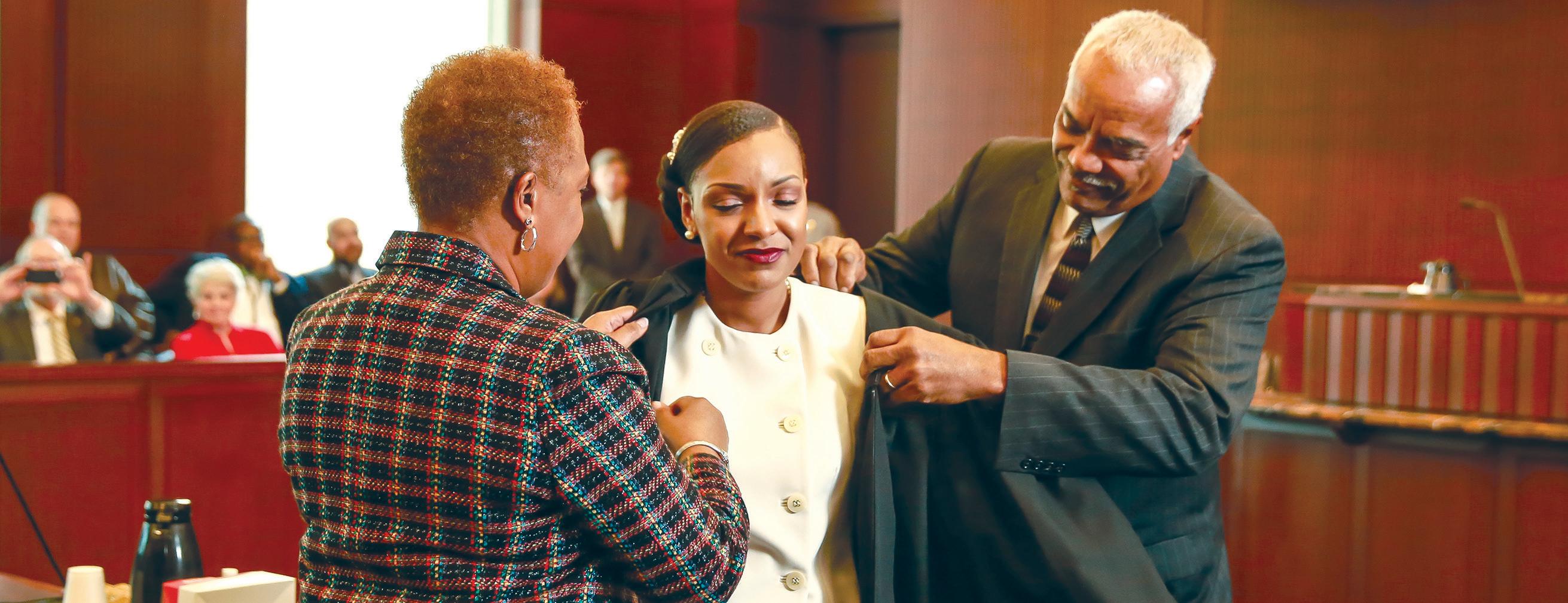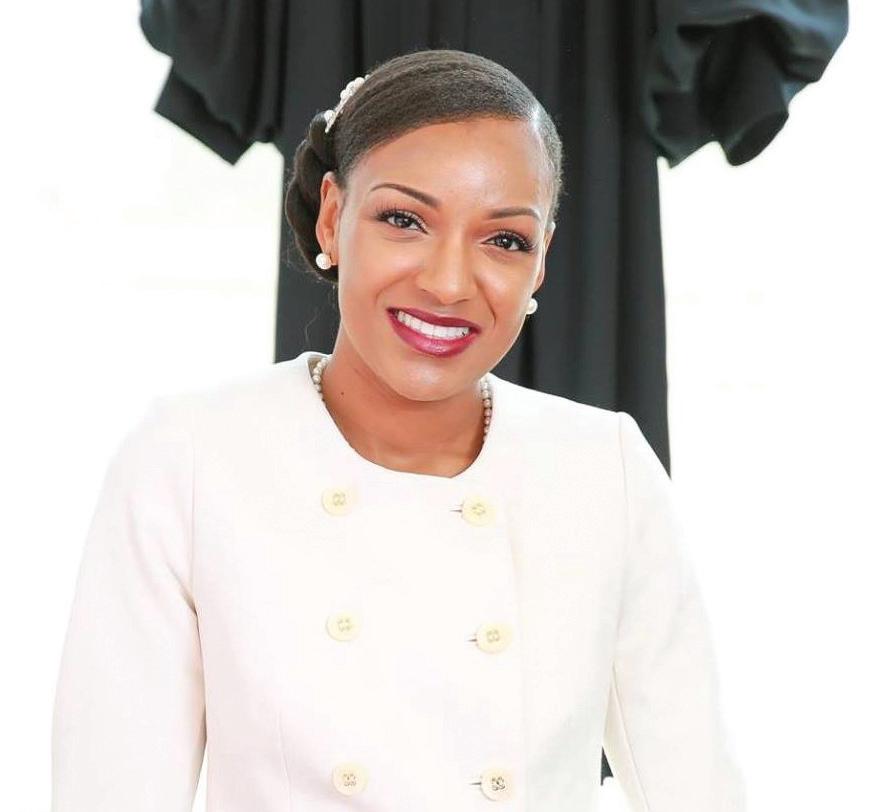
10 minute read
Father-Daughter Reflections
fter watching Perry Mason as a kid on a black and white TV, I decided that I wanted to be a lawyer. I was born and raised in the small town of Taylorsville, North Carolina, the eighth of ten kids, the last seven of which were the product of my parent’s marriage to each other. I attended an allblack school for grades one through eight until the Civil Rights Movement put an end to segregation. I was the first and last black male to graduate with honors from Taylorsville High School as it closed the year after I graduated. Thanks to affirmative action, I was accepted to and graduated from North Carolina State University in 1974.
Advertisement
After working several jobs, I decided that I would become a lawyer and open my own law practice; however, because my grade point average in undergrad was only 2.7 and my LSAT score was marginal at best, I theorized my chances of being admitted to most law schools was limited. I applied to NCCU School of Law because of I felt I might have an ace in the hole. While I was a senior at N. C. State, I interned at the North Carolina General Assembly with the Hon. Mickey Michaux. During one of our many talks, he had mentioned that he was NCCU School of Law Alumnus. That relationship turned out to be a blessing because one of the things that Mr. Michaux emphasized when trying to get a bill passed was “it’s not always what you

know, but who you know.” I figured that a letter of recommendation from one of Central’s more distinguished graduates wouldn’t hurt. He was the “ace in the hole” that I was relying on. I drove to Durham and, without an appointment, requested an audience with him, hoping that he would remember me. Not only did he remember me, he wrote a wonderful, glowing letter about how I was the type of student that NCCU School of Law would be proud of one day. I honestly believe that his letter and Central’s policy of admitting students that most law schools wouldn’t take a chance on are the only reasons I was able to get my foot in the door. I will always be indebted to him and the law school for giving me that chance.
When I entered the law school in the fall of 1976, because I was broke, I went to the Kmart where I had trained in 1974 and took a part-time job running the toy department. Halfway through my freshman year, my older brother Thomas, moved to Durham, and using the money from his G.I. bill student loan, enrolled in the local community college and paid the rent so I could devote more time to my studies. At the time, the School of Law was being pressured by the State Bar and the national accreditation authorities to improve its bar passage rate. In an effort to reverse that trend, a strict disciplinarian by the name of Harry Groves was hired as Dean of the law school. A few of my classmates, including Justice Michael Morgan, and I often called him “General Groves”. My class was the first class under Dean Grove’s leadership and he was determined that the law school was going to turn around with the class of 1979. His methods were scary. My theory was that he had a trap door in his office. I can’t tell you how many times I saw fellow classmates, i.e., those who weren’t serious about their studies, go into his office and never emerge. Once they went in his office, they were never seen again. I made it a point to never go into the dean’s office for any reason. Once I got past the shock of my first year, I adjusted and actually enjoyed the time I spent in the old law school building located in the center of the main campus. The faculty, which included two former deans, was on the same page as Dean Groves and we really felt we were the class that was going to turn things around for the law school. In my third year, I interned with the Durham County District Attorney’s office. That turned out to be a fortuitous assignment as it apparently helped me land a job as an assistant District Attorney in Wake County. The night I got my bar results, I got a call from Randolph Riley, Wake County’s elected district attorney, who asked if I had passed the bar. When I told him yes, he wanted to know if I was interested in going to work for him. Since this was the only job I had applied for two weeks earlier, of course I was interested.
I started working for Randolph Riley on September 17, 1979. It was great trial experience as he had a system where assistant district attorneys assigned to district court, once a case was appealed, had to try it again in Superior Court. I learned a lot from retrying crappy misdemeanor cases against some really crafty old lawyers. The most valuable lesson about trying cases that I learned from those guys was that “it isn’t the guy who has the best case that usually wins, but
the guy who puts on the best show”. Quite a few of the misdemeanor appeals that I thought were “slam dunks” were lost because those slick old geezers took me to school. I worked for the Wake County District Attorney’s office for two years, thirteen days and five hours. I left three hours early on my final day, September 30, 1981. Little did I know that thirty-one years later, on October 1, 2012, my daughter would take my old job.
I moved back home to the Hickory area and joined a husband and wife firm that
had offices in Catawba and Alexander County. I will never forget the first day I went to District Court in Catawba County and introduced myself to the Chief District Court and another old lawyer who happened to be standing at the counter in the clerk’s office. The judge welcomed me to the bar and wished me luck. The old lawyer sort of sneered and said, “You’re going to starve up here. Nobody is going to come to a black lawyer in Catawba County.” I thought to myself, “Well, thank you for that warm welcome.” Fortunately, I had been trained at the NCCU School of Law and it didn’t take me long to prove him wrong. In fact, once I made a reputation for myself, most of my paying clients, especially in criminal cases, were Caucasian. You see, I remembered (1) how I was taught the importance of preparation at Central and (2) what I learned from those old lawyers in Wake County. So when I went to trial, I made sure that I was prepared and that I was going to be a better “showman” than the assistant district attorney who was trying the State’s

case. Using that method, I won a lot more cases that on paper looked like I didn’t have a “snowballs chance in hell” of winning. In the six years I was in private practice, I only lost one jury trial in Alexander County as a defense attorney and it was overturned on appeal. My track record was almost as impressive in Catawba County. I didn’t win every case I tried there, but I won a lot more than I lost.


Despite the fact that my practice was starting to show positive results, the fact of the matter, was that I didn’t enjoy private practice. So when a job opening came up for an assistant district attorney in Catawba County, I applied for and was hired as the first black assistant district attorney for the 25th Prosecutorial District. After I had been there a little over a year, the chief ADA died unexpectedly at 48 years of age. I became the chief assistant for Catawba County. Without bragging, suffice it to say that I made a reputation for myself as someone that defense attorneys and criminals didn’t want to go up against. I took a job as an ADA in Iredell and Alexander Counties in 2002 again as the first black assistant district attorney for the 22nd Prosecutorial District. I retired from prosecuting in March of 2012, the same year that my daughter entered the profession. I owe my entire career to NCCU School of Law for affording me the opportunity to attend that wonderful institution.
Jason R. Parker, NCCU School of Law, Class of 1979
Growing up, I never wanted to be a lawyer.

rowing up, I never wanted to be a lawyer. Every time someone inquired about my future dreams or aspirations, they would say, “oh, do you want to be a lawyer like your daddy?” My response was always, “absolutely not. I want to be a doctor.” It wasn’t an attempt to shade my father and all of his accomplishments, but I really wanted to set my own path. Honestly, he was extremely encouraging and wanted me to pursue any dream or goal that I had. Fast forward to 2005, I was accepted and enrolled at Wake Forest University in hopes of becoming our family’s first doctor. That hope died after the first semester of biology when I barely made it out with a C. I realized that I was not built for the pre-med track, but still did not want to face the music of what I would ultimately become.

It wasn’t until my second semester of my Junior year of undergrad, after another failed attempt at being a psychology major that I knew what God had called me to do. Not only did I like to argue and talk a lot, but I really wanted to use those skills to help people. So, I called my dad and said, “I want to be a prosecutor.” He was shocked, but proud that I had made the decision on my own. I also knew that the only law school that I wanted to attend was North Carolina Central University School of Law.
Without having toured the school or even visited Durham, I applied and was accepted in May of 2009. I knew what NCCU Law had done for my dad, and quite frankly, he was one of the most devastating litigators that I knew. It made me proud to walk down the hallways of NCCU Law and see the photo of the Class of 1979 with my dad and his huge afro alongside his other legendary classmates such as James “Butch” Williams and Supreme Court Justice Michael R. Morgan.
NCCU Law lived up to everything that I had hoped for and more. For the first time, I was being educated by Professors and Deans who looked like me and I understood what a dynamic impact that that has on students. While my brain was retrained into “thinking like a lawyer,” my core values taught by my mom and dad to ensure that I lived a life of service to others was further developed through the opportunities provided to me by NCCU Law. Upon graduation, I began at the same job that my father did as a prosecutor at the Wake County District Attorney’s Office. From there, I became an Assistant Attorney General at the North Carolina Department of Justice. In 2017, I was appointed by Governor Roy Cooper to become the youngest and third African American female District Court Judge in Wake County history. I owe everything to God, my parents, and family, and NCCU Law for the education and opportunities that I have been afforded. As the current President of the NCCU Law Alumni Association, I’m grateful to give back to the school that has provided an impactful legacy worldwide for 80 years and beyond!
Hon. Ashleigh Parker Dunston NCCU School of Law, Class of 2012







